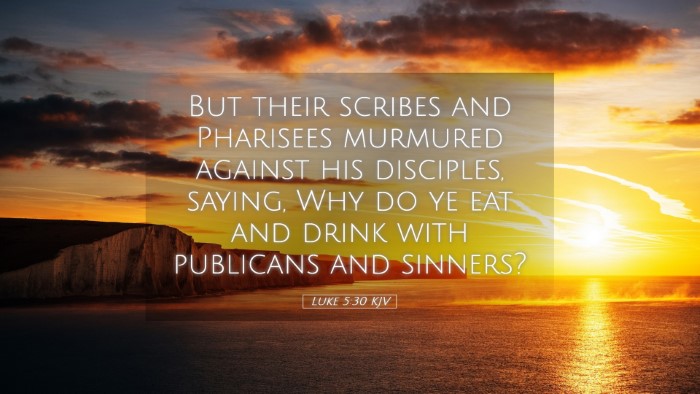Commentary on Luke 5:30
Luke 5:30 states, "But their scribes and Pharisees murmured against his disciples, saying, Why do ye eat and drink with publicans and sinners?" This verse captures a pivotal moment in Jesus’ ministry, where He demonstrates the radical nature of His mission to seek and save the lost.
Context and Background
The passage occurs in the context of Jesus calling Levi (Matthew), a tax collector, to follow Him. Levi's acceptance of Jesus' invitation leads him to host a great banquet for Him, inviting many of his colleagues—publicans and sinners. The response of the Pharisees reflects their rigid adherence to the Law and their disdain for those considered unclean or morally inferior.
Insights from Commentaries
Matthew Henry's Commentary
Matthew Henry emphasizes the spiritual blindness of the Pharisees and their misunderstanding of Jesus’ mission. He notes that their murmuring against Jesus' choice of company reveals a heart void of compassion. They fail to grasp that Jesus came to save sinners, not to cater to the self-righteousness of the law keepers. Henry identifies the sinners in the passage not merely as social outcasts but as those who recognize their need for redemption, contrasting this with the Pharisees' false sense of righteousness.
Albert Barnes' Notes on the Bible
Albert Barnes presents the reaction of the scribes and Pharisees as a critical reflection of their viewpoint on righteousness. He points out that they equate religious observance with social distance from sinners, highlighting the hypocrisy in their attitudes. Barnes asserts that by associating with social outcasts, Jesus defies traditional norms and illustrates God’s grace extended to those who admit their brokenness. He emphasizes that Christ’s method of reaching people was inclusive—a striking juxtaposition with the exclusivity practiced by the religious leaders of the time.
Adam Clarke's Commentary
Adam Clarke analyzes the term 'publicans' within the context of first-century Jewish society. He notes that publicans were often despised for their collaboration with Roman authorities and extortion. Clarke argues that Jesus' willingness to engage with publicans and sinners serves as a powerful example of divine grace and the fundamental Christian teaching that mercy is paramount. He offers insight into the transformative potential of acceptance and inclusion, suggesting that those considered outcasts may be the very people God uses for His purposes.
Theological Implications
This verse raises pertinent questions regarding the nature of ministry and the church’s relationship with the world:
-
Grace Over Judgment: The incident urges a reevaluation of how churches view engagement with communities deemed sinful or unworthy. Pastors and theologians are encouraged to foster an atmosphere of grace rather than judgment.
-
Inclusivity of the Gospel: Jesus’ model challenges contemporary practices that may exclude individuals based on perceived morality. This inclusivity becomes a theological cornerstone for understanding God’s redemptive purpose.
-
Self-Righteousness: The Pharisees' response serves as a warning against self-righteousness within religious communities. There is a need for ongoing self-examination regarding one’s attitude toward others who struggle and sin.
-
Missionary Mandate: The implications for evangelism are profound; Jesus’ model illustrates that ministry should reach out to all communities, particularly those marginalized by society.
Practical Applications
For pastors, students, and theologians grappling with this passage, several applications arise:
-
Engagement with the Marginalized: Actively seek to engage with those who are often overlooked or judged by society.
-
Fostering Open Dialogues: Encourage church communities to participate in honest discussions about sin, grace, and community, moving beyond a purely doctrinal approach.
-
Modeling Acceptance: Like Jesus, church leaders should embody a spirit of acceptance, showing that the church is a place for healing and hope for everyone.
-
Reflecting on Personal Attitudes: Regularly assess personal and congregational attitudes toward others, ensuring that criticism does not overshadow compassion.
Conclusion
In Luke 5:30, we are confronted with the radical nature of Jesus’ mission and the call to reflect His heart for the lost. Through the insights of Matthew Henry, Albert Barnes, and Adam Clarke, we see the critical importance of grace, inclusivity, and genuine engagement in ministry. This passage remains a profound reminder and challenge to the modern church to embrace those whom society deems unworthy, echoing Jesus’ own example of love and grace toward publicans and sinners.


